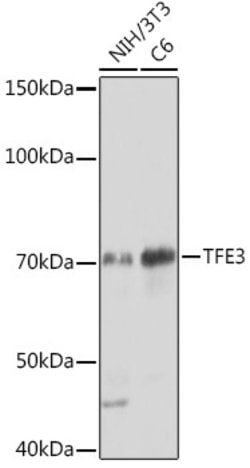TCR alpha/beta Monoclonal Antibody (R73), FITC, Invitrogen™
Manufacturer: Thermo Scientific
Select a Size
| Pack Size | SKU | Availability | Price |
|---|---|---|---|
| Each of 1 | PIMA544097-Each-of-1 | In Stock | ₹ 42,942.50 |
PIMA544097 - Each of 1
In Stock
Quantity
1
Base Price: ₹ 42,942.50
GST (18%): ₹ 7,729.65
Total Price: ₹ 50,672.15
Antigen
TCR alpha/beta
Classification
Monoclonal
Concentration
0.5 mg/mL
Formulation
PBS with 15mM sodium azide; pH 7.4
Gene Accession No.
0
Gene Symbols
LOC290071, Tcrb
Immunogen
Rat T blasts and erythrocytes
Quantity
100 μg
Primary or Secondary
Primary
Target Species
Non-human Primate, Rat
Product Type
Antibody
Isotype
IgG1 κ
Applications
Flow Cytometry
Clone
R73
Conjugate
FITC
Gene
LOC290071
Gene Alias
FLJ22602; IMD7; LOC290071; MGC117436; MGC22624; MGC23964; MGC71411; RATTCB; RATTCBC1; RGD1359684; similar to RIKEN cDNA A430107P09 gene; T cell receptor beta locus; T3/TCR complex; TCB; TCBC1; t-cell antigen receptor; T-cell receptor alpha constant; T-cell receptor beta chain; T-cell receptor V alpha; tcr alpha; TCR alpha/ beta; TCR beta; TCRA; Tcrb; TRA; Tra29; TRAC; TRB; TRB@; TRCA
Host Species
Mouse
Purification Method
Size-exclusion chromatography
Regulatory Status
RUO
Gene ID (Entrez)
24820, 290071
Content And Storage
4° C, store in dark, DO NOT FREEZE!
Form
Liquid
Description
- The T cell antigen receptor (TCR) consists of a ligand-specific alpha/beta heterodimer non-covalently associated with five invariant chains including the CD3 gamma/delta/eta and zeta subunits, all of which are required for efficient surface expression
- T cell activation through the TCR induces cellular differentiation and/or proliferation and the production of lymphokines and cytokines
- Both the CD3 and TCR zeta subunits are proposed to be responsible for the intracellular signal transduction events
- Majority of T cells present in the blood, lymph and secondary lymphoid organs express TCR alpha/beta heterodimers, whereas the T cells expressing TCR gamma/delta heterodimers are localized mainly in epithelial tissues and at the sites of infection
- The subunits of TCR heterodimers are covalently bonded and associate with the CD3 subunits in the endoplasmic reticulum to form functional TCR-CD3 complex
- Lack of expression of any of the chains is sufficient to stop cell surface expression
- The ability of T cell receptors (TCR) to discriminate foreign from self-peptides presented by major histocompatibility complex (MHC) class II molecules is essential for an effective adaptive immune response
- TCR recognition of self-peptides has been linked to autoimmune disease
- Mutant self-peptides have been associated with tumors
- Engagement of TCRs by a family of bacterial toxins know as superantigens has been responsible for toxic shock syndrome
- Autoantibodies to V beta segments of T cell receptors have been isolated from patients with rheumatoid arthritis (RA) and systemic lupus erythematosus (SLE)
- The autoantibodies block TH1-mediated inflammatory auto-destructive reactions and are believed to be a method by which the immune system compensates for disease (ref5)
- T Cell and TCR Diversity Most human T cells express the TCR alpha-beta and either CD4 or CD8 molecule (single positive, SP)
- A small number of T cells lack both CD4 and CD8 (double negative, DN)
- Increased percentages of alpha-beta DN T cells have been identified in some autoimmune and immunodeficiency disorders
- Gamma-delta T cells are primarily found within the epithelium
- They show less TCR diversity and recognize antigens differently than alpha-beta T cells
- Subsets of gamma-delta T cells have shown antitumor and immunoregulatory activity.

